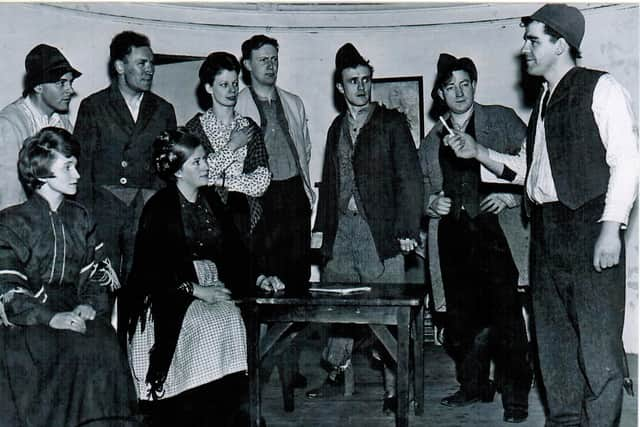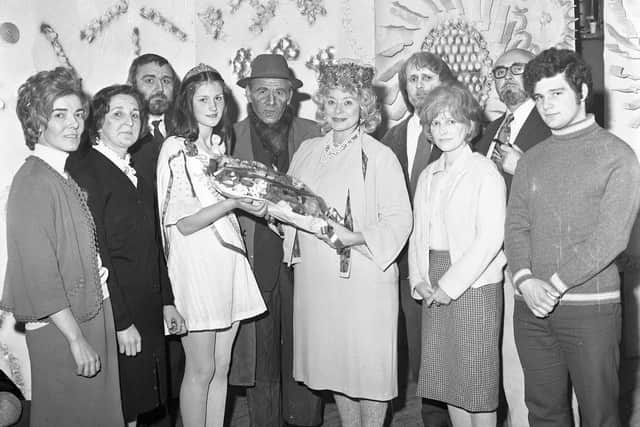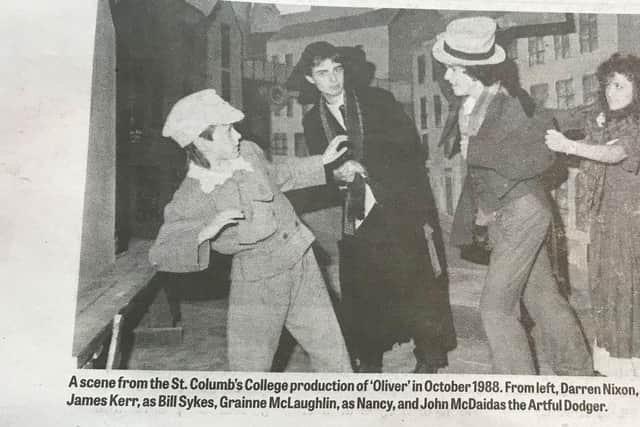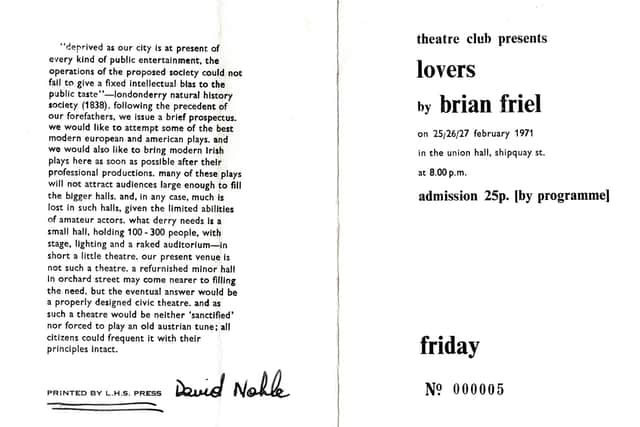New memoir by Gerry Downey salutes Wartime ‘Derry at Play’
and live on Freeview channel 276
Derry at Play: Memories of the Theatre Club and Other Drama is a colourful – and sometimes poignant – retelling of some of the city’s best and worst times.
After the Troubles broke out, Derry’s theatre and entertainment sector all but collapsed. Touring companies stopped visiting the city, local groups suspended productions and festivals were cancelled.
Advertisement
Hide AdAdvertisement
Hide AdBut one troupe of amateur players based at the Little Theatre on Orchard Street was determined to keep the candle lit. From 1970 to 1994, the Theatre Club’s staged more than 60 plays, from Friel to Shakespeare, to hometown audiences starved of live shows.


It wasn’t easy. Players and patrons had to negotiate riots, checkpoints and barricades to get to performances. Productions were interrupted by bombings. But the Theatre Club insisted that the show must always go on.
Besides the author, several other Theatre Club ‘originals’ - including Jean Flaherty, Mairead Mullan, Connor Porter, Jim Craig, Art Byrne, Gerry McLaughlin and Eilish Ryder - also contribute their memories to the book, which is published by Colmcille Press.
Featuring scores of photographs, clippings and old programmes, the memoir features a 250-strong Dramatis Personae in which you'll find some big national and international names who cut their teeth in, or contributed to, the Derry amateur drama scene.
Advertisement
Hide AdAdvertisement
Hide AdThese include: singer-songwriter Johnny McDaid; Undertones frontman Paul McLoone, TV actresses Amanda Burton and Eva Birthistle, the playwright Brian Friel, Field Day actors Liam Neeson and Stephen Rea, legendary Irish actress Siobhan McKenna (who started a post-performance riot in the Bogside Inn), film actress Brónagh Gallagher, novelist Jennifer Johnston, and the suspected Russian spy RD 'Reggie' Smith (check his Wiki entry).


Derry at Play is available from bookshops at £10 and online from colmcillepress.com.
Below is an extract from the book:
Act I – Birthing Pains (A group of young players searches for a home)
Derry’s Theatre Club was certainly in existence by 1970 but was possibly conceived earlier. The company accounts indicate that before Lovers, the club’s first stage production in February 1971, the players had hosted seven rehearsed readings in the previous financial year: Step in the Hollow; The Playboy of the Western World; The Importance of Being Earnest; The Death and Resurrection of Mr Roche; The House of Bernarda Alba; Long Day’s Journey into Night; and Philadelphia Here I Come.
Advertisement
Hide AdAdvertisement
Hide Ad

The Theatre Club would go on to produce forty-four stageplays over the next fourteen years, and at least another 18 that we can trace before winding down in 1994, though no definitive record seems to exist.
As an incubator, the club would have few equals. It would have a profound impact not just on the North West drama scene but also across the island and across the globe. Its long-standing friend and patron Brian Friel would go on to conquer Broadway; producer Jennifer Johnston would win international awards for her novels; while other young recruits would go on to become filmmakers, broadcasters, writers and musicians of great renown.
The club’s first surviving programme dates from November 9, 1970, for the reading of Tom Kilroy’s Death and Resurrection of Mr Roche. This event took place opposite the Guildhall at the old City Hotel, at the time one of Derry’s most prestigious venues. (It was blown up in May 1972 and never rebuilt.) Clareman Art Byrne was producer for the night; the players were Byrne himself, Sean ‘Barlow’ Cassidy, Gerry Downey, Eddie Mailey, Seán McMahon, Dinah Sinton and Barney Toal; and they took £2.70 at the door. Even in 1970, that was not a lot of money.
It was Seán McMahon – a driving force behind the club from its instigation – who saw the need to find a home for the players, and he approached Father Edward Daly (later Bishop) to ask for use of what would become known as the Little Theatre on Orchard Street. The facility was a 100-seat former minor hall, downstairs and around the corner from the much grander 900-seat St Columb’s Hall, owned by the church.
Advertisement
Hide AdAdvertisement
Hide Ad

McMahon made it clear to Daly from the outset that he could not expect script approval before performances, something the church was demanding in other parts of the island at that time. Sligo-born Jean Flaherty remembers while performing as a student in Galway scripts being returned by priests with full sections scored out with blue pen – in one case, an entire one-act play was struck out.
Daly, however, was a genuine supporter of the arts and gave the Theatre Club fair wind, and he rented them the Little Theatre. A short time afterwards, however, the young priest did set up another troupe, the 71 Players, which would also use the theatre. And whilst there was a perceived rivalry between the groups – some of the Theatre Club might have fancied themselves as intellectuals, and the ‘78 Players’ were all about filling houses etc – there was, in reality, great respect between the groups and they would support the other’s productions.
A significant portion of the Theatre Club’s early membership, including its first chair Bridget Keenan, would have come from the North West’s other drama groups, many of which stopped performing because of the Troubles. Pre-1969, there was a lively amateur scene in the city, which included: St Columb’s College Past Pupils Union, the Convent of Mercy (later Thornhill) PPU, the Londonderry Drama Society, the Londonderry Amateur Operatic Society (LAOS), the Londonderry Musical Society, the YMCA Players, the City of Derry Drama Club (CDDC), the Tower Players, An Craobh, the Colmcille Players, the Foyle Players, the Kieran Players, the Green Circle, and St Enda’s D.S. There were also regular drama festivals, for adults and students, in Derry, West Tyrone and Inishowen.
But the conflict made life difficult, if not nigh impossible, for theatre. Touring groups stopped visiting the city, and audiences for those who did make the journey were dropping. Festivals were cancelled, and producers became more and more risk averse. Performers and audiences were too frightened to leave home.
Advertisement
Hide AdAdvertisement
Hide AdIn her book From Farquhar to Field Day: Three Centuries of Music and Theatre in Derry~Londonderry, (History Press Ireland, 2012), Nuala McAllister Hart catalogued how the town, to quote Phil Coulter, had been “brought to its knees”.
Groups like the LAOS, St Columb’s Cathedral Music Society, and Feis Dhoire suspended activities; others like the Britannia Band were forced into closure as members were not able to attend practice sessions in the city centre. The CDDC, meanwhile, lost all its equipment in a malicious fire, forcing it to shut down.
The Guildhall, the city’s number one venue, was bombed twice in 1972 rendering it unusable, leaving Magee’s Great Hall as the city’s last remaining prestige facility. And in 1976, the murder of one of the town’s most prominent amateur performers, Joey Glover, would shake the North West drama community to its core.
It was by no means an easy beginning.